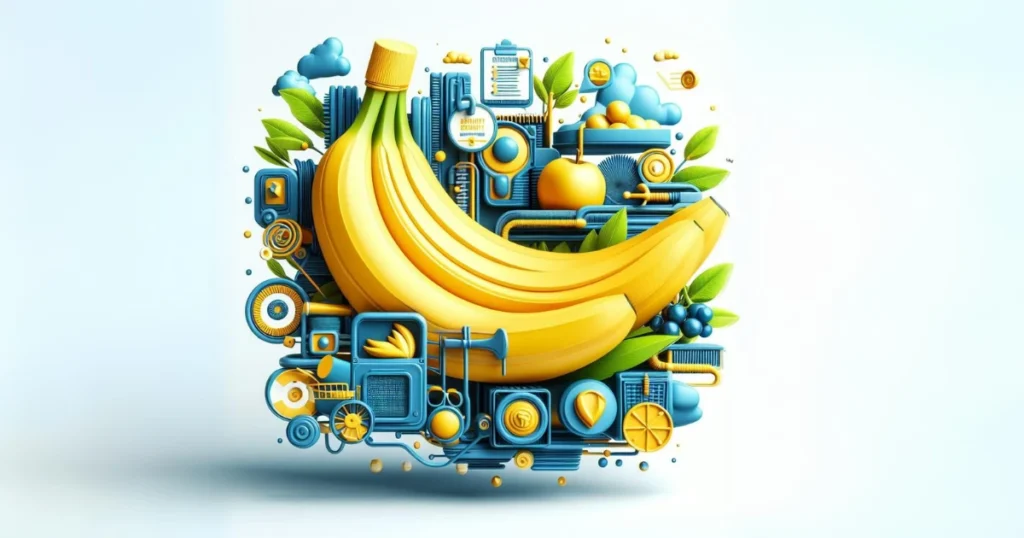
Bananas are one of the world’s most important foods. Native to Southeast Asia, these plants belong to a group known as Musa. Many warmer parts of the world also grow them.
You can get a lot of good things from bananas, like fiber, potassium, vitamin B6, vitamin C, and many antioxidants and phytonutrients.
There are many kinds and sizes. Green to yellow is the most common color, but some types are red.
This piece provides everything you need to know about bananas.
Nutrition facts
One medium-sized banana (100 grams) has the following nutrition facts:
- Calories: 89
- Water: 75%
- Protein: 1.1 grams
- Carbs: 22.8 grams
- Sugar: 12.2 grams
- Fiber: 2.6 grams
- Fat: 0.3 grams
Fibers
Resistance starch, which doesn’t break down in your gut, makes up a large portion of the starch in unripe bananas.
Bacteria break down this starch in your large intestine to make butyrate, a short-chain fatty acid that seems to be good for your gut health.
You can also get a lot of other types of fiber from bananas, like pectin. Some of the pectin in bananas breaks down in water.
One important reason why bananas get soft over time is that the amount of water-soluble pectin increases as the bananas ripen.
Resistant starch and pectin both slow down the rise in blood sugar after a meal.
Protein
Bananas contain about 1.3 grams of protein per medium-sized fruit. While they are low in protein compared to other foods, bananas are rich in vitamins, minerals, and fiber.
They are best enjoyed as part of a balanced diet, often paired with other protein sources for added nutritional value.
Carb
Bananas have a lot of carbs, which mostly come in the form of starch when they’re not ripe and sugar when they are.
As bananas ripen, the amount of carbs they contain changes in a big way.
The main ingredient in raw bananas is starch. Green bananas, based on their dry weight, contain up to 80% sugar.
The banana transforms its starch into sugar as it ripens. When the banana is fully ripe, there is less than 1% starch left.
Sucrose, fructose, and glucose are the main types of sugar found in grown bananas. When bananas are ripe, they can have more than 16% of their fresh weight in sugar.
The glycemic index (GI) of bananas is between 42 and 58, based on how ripe they are. With the GI, you can see how quickly the carbs in food raise your blood sugar.
The bananas’ low GI is due to their high fiber and tough starch content.
Vitamins and minerals
Bananas provide a rich array of essential vitamins and minerals, including potassium, vitamin B6, and vitamin C.
- Potassium: Bananas are an excellent source of potassium. A potassium-rich diet can lower blood pressure in people with elevated levels and improve heart health.
- Vitamin B6: Bananas are high in vitamin B6. One medium-sized banana can provide up to 33% of the daily value (DV) of this vitamin.
- Vitamin C: Like most fruits, bananas are an excellent source of vitamin C.
Other plant compounds
There are many kinds of bioactive plant compounds in fruits and vegetables, and bananas are no different.
- Dopamine: Dopamine is a neurotransmitter that plays a big role in your brain, but it doesn’t get into your brain through the blood. Instead, it guards against damage.
- Catechin: Bananas have a lot of protective flavonoids, but catechins are the most important ones. They may be beneficial to your health in a variety of ways, such as lowering your risk of heart disease.
Health benefits of bananas
Heart health
Heart disease kills more people than any other illness in the world. Bananas have a lot of potassium, which is a chemical that helps keep your heart healthy and your blood pressure normal. A medium-sized banana contains about 0.4 grams of this mineral.
A comprehensive review of numerous studies revealed a 26% reduction in the risk of heart disease when consuming 1.3 to 1.4 grams of potassium daily.
Furthermore, bananas contain flavonoids, an antioxidant that significantly reduces the risk of heart disease.
Good digestive health
Green bananas that aren’t ripe have a lot of resistant starch and pectin, which are both types of dietary fiber.
Pectins and resistant starch are prebiotic foods that help good bacteria grow in the gut.
Good bacteria in your gut break down these fibers to make butyrate, a short-chain fatty acid that is good for gut health.
Cons of bananas
People with type 2 diabetes have different ideas about whether or not bananas are good for them.
Bananas do have a lot of sugar and starch. So, it makes sense that they would raise blood sugar a lot.
But because bananas have a low GI, eating a few of them shouldn’t make your blood sugar rise as much as eating other high-carb foods.
So, people with diabetes shouldn’t eat a lot of bananas that are too ripe. It’s crucial to closely monitor your blood sugar levels after consuming a significant amount of sugar and carbohydrates.
In other news, some studies show that this fruit can make you more likely to get constipated, while others say that bananas may have the opposite effect.
When eaten in moderation, bananas don’t cause any major health problems.
The bottom line
People around the world consider bananas to be one of their favorite foods. They primarily consist of carbohydrates and contain significant amounts of vitamins, minerals, and antioxidants. They have potassium, vitamin C, catechin, and resistant starch, among other good things for you.
As part of a healthy lifestyle, eating bananas on a daily basis may have many benefits, such as better heart and digestive health.


